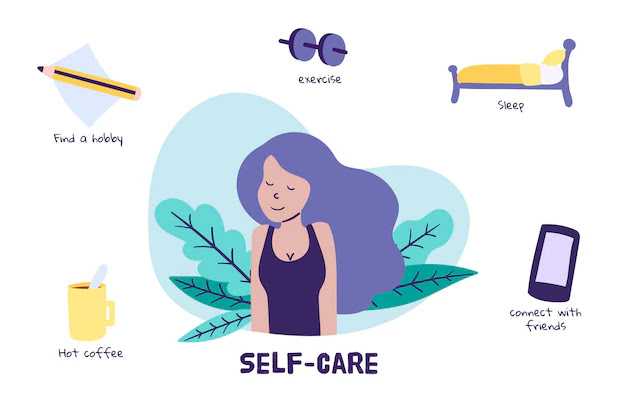
Self Care
I. The Importance of Self Care
1. Understanding Self Care: Self care encompasses a wide range of activities and practices that prioritize your well-being. It is not selfish; rather, it's a fundamental aspect of maintaining a healthy and balanced life.
2. The Stress Epidemic: Modern life is filled with stressors - from work pressures to personal responsibilities. Chronic stress can take a toll on your physical and mental health, making self care even more crucial.
3. Self Care Is Not Self Indulgence: Contrary to popular belief, self care is not synonymous with indulgence. It's about making conscious choices that nurture your overall health, including your physical, emotional, and mental health.
II. Dimensions of Self Care
1. Physical Self Care: Physical self care involves tending to your body's needs. This includes activities like regular exercise, maintaining a balanced diet, getting enough sleep, and practicing good hygiene.
2. Emotional Self Care: Emotional self care focuses on understanding and addressing your emotions. Strategies include journaling, seeking therapy or counseling, and engaging in activities that bring you joy and peace.
3. Mental Self Care: Mental self care is about keeping your mind sharp and balanced. This can be achieved through mindfulness meditation, learning new skills, or seeking intellectual stimulation.
4. Social Self Care: Our connections with others play a significant role in our well-being. Social self care involves nurturing healthy relationships, setting boundaries, and seeking support when needed.
5. Spiritual Self Care: Spiritual self care goes beyond religious beliefs and includes practices that give you a sense of purpose and connection to something greater than yourself. This can involve meditation, nature walks, or engaging in activities aligned with your values.
III. Practical Self Care Strategies
1. Creating a Self Care Routine: Establishing a daily or weekly self care routine can help ensure you prioritize self-care consistently. This routine can include specific activities from each dimension of self-care.
2. Saying No: Learning to say no is a vital part of self care. Setting boundaries and managing your commitments can prevent burnout and preserve your well-being.
3. Mindfulness and Meditation: Mindfulness practices and meditation can help you stay present and reduce stress. These techniques promote self-awareness and emotional regulation.
4. Nurturing Hobbies and Interests: Engaging in hobbies and interests that bring you joy is a form of self care. Whether it's painting, gardening, or playing a musical instrument, these activities recharge your spirit.
5. Seeking Professional Help: Sometimes self care involves recognizing when you need professional support. Whether it's therapy, counseling, or medical care, seeking help is a courageous act of self care.
IV. Self Care for Different Life Stages
1. Self Care for Parents: Parenting can be demanding, and self-care is essential for maintaining your well-being while caring for your children. Balancing your needs with those of your family is key.
2. Self Care for Students: The pressures of academic life can be overwhelming. Students can benefit from time management, stress reduction techniques, and social self care to maintain a healthy balance.
Read More: Physical Safety

Conclusion
Self care is not a luxury; it's a fundamental aspect of living a balanced and fulfilling life. By understanding the importance of self care and embracing its various dimensions, you can take proactive steps to prioritize your physical, emotional, and mental well-being. Practical strategies, such as creating a self care routine, saying no when necessary, and seeking professional help when needed, empower you to live a happier and healthier life. Remember, self care is not selfish; it's an act of self-love and self-preservation. So, embrace the art of self-care and embark on a journey of self-discovery and self-nurturing that will enrich your life in countless ways.
FAQ
Ques 1: What is self care?
Ans: Self care refers to deliberate actions individuals take to prioritize their physical, emotional, and mental well-being. It involves practices like relaxation, healthy eating, exercise, mindfulness, and setting boundaries. Self care helps reduce stress, improve overall health, and maintain a balanced and fulfilling life in the face of life's demands.
Ques 2: Why is self care so important?
Ans: Self care is essential for overall well-being as it:
a) Reduces Stress: Helps manage daily pressures.
b) Promotes Mental Health: Supports emotional resilience.
c) Prevents Burnout: Prevents exhaustion and fatigue.
d) Enhances Physical Health: Supports a healthy lifestyle.
e) Improves Relationships: Enables better interactions.
f) Fosters Self-compassion: Encourages self-kindness and self-awareness.
g) Increases Productivity: Enhances focus and energy.
Ques 3: Who are the best candidates for self-funding long-term care costs?
Ans: The best candidates for self-funding long-term care costs are individuals who have substantial financial resources, such as savings, investments, or assets, and are comfortable with the risk of potentially high long-term care expenses. They should have no difficulty covering these costs without relying on government assistance or insurance.
Ques 4: Which type of medicine emphasizes self care and illness prevention?
Ans: Holistic or integrative medicine emphasizes self-care and illness prevention. It views health as a balance of physical, mental, and emotional well-being and encourages practices like nutrition, exercise, stress management, and mindfulness to maintain health and prevent illness. This approach considers the whole person and their lifestyle choices.
Ques 5: Why does taking care of yourself physically contribute to healthy self-esteem?
Ans: Taking care of oneself physically contributes to healthy self-esteem because it reinforces a positive self-image. When individuals prioritize their physical well-being through exercise, proper nutrition, and self care, they often feel better about themselves, leading to increased self-confidence and a more positive self-perception, which in turn boosts self-esteem.







Do Leave Your Comment